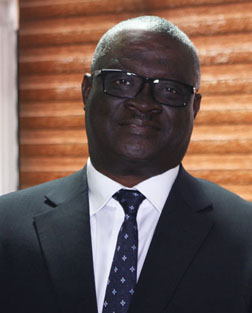Executive Spotlight Interview with Richard K. Hlomador Founder and Chief Network Architect, K-NET

Amsterdam, the Netherlands, September 15, 2023--At IBC 2023 held in Amsterdam, Satellite Executive Briefing caught up with Richard K. Hlomador is the Founder and Chief Network Architect of K-NET, a full-service, state-of-the-art teleport based in Ghana, West Africa. He founded the company in 1996 as a computer hardware systems and accessories company and grew it into one of the leading teleports serving Africa and beyond. The company currently provides among others, satellite broadcasting, content distribution, Internet of Things (IoT), HNO and VNO services as Solar as a Service. Excerpts of the interview follows:
Your company has been in business since 1996, how has your company evolved since then and how do you see your position in the markets that you are active in?
Our journey began in 1996 as specialists in computer hardware systems and accessories. Over the years, we’ve transformed into a telecom industry leader, spearheading connectivity across Africa. In the span of 27 years, K-NET has revolutionised various telecom services, such as Digital Terrestrial Television, Digital Audio Broadcasting, and satellite-based IoT networks. We also have a strong dedication to sustainable energy with a focus on Solar Systems. One of our primary goals is to drive the sustainable energy agenda by connecting not only our own sites but also those of others. This approach ensures that we play a pivotal role in promoting renewable energy adoption while fostering connectivity across various locations in West Africa.
Our roles span from Digital Terrestrial Television (DTT), Digital Audio Broadcasting (DAB), Direct-to-Home (DTH) services, Rural Telephony, Internet Service Provider (ISP), Network Service Provider (NSP), and satellite-based IoT networks across Africa.
What are the key trends that you see in the teleport business and how is your company leveraging the opportunities as a result of these key trends?
Teleports have become an integral part of global communications. The shift to IP contribution methods like SRT / Zixi has transformed how content is delivered, making it more flexible and accessible worldwide. Our focus is on providing stable and reliable incoming traffic (Contribution feeds) to satellite distribution networks. With the ability to pick content from anywhere globally and uplink from any teleport, we’re capitalising on the trend by enhancing our capabilities in delivering seamless and efficient connectivity.
What differentiates your company from other teleports/service providers?
While many service providers in other parts of the world have established infrastructure, Africa faces unique challenges in terms of poor infrastructure. Our key differentiation lies in our ability to create tailor-made solutions that thrive even in these challenging conditions. We’ve excelled by outperforming European and US standards while adapting to local conditions. Our approach involves crafting solutions that cater to the specific needs of our customers, addressing the limitations of the African infrastructure.
How do you see your company in the next few years? What will be the key drivers for your business?
Our vision is to continue dominating the sector while embracing new technologies and digital platforms. We’re focused on empowering young entrepreneurs and intrapreneurs to take over and innovate on these platforms. The key drivers for our business will be the integration of cutting-edge technology and the nurturing of local talent. By staying ahead of technological advancements and fostering a new generation of leaders, we aim to solidify our position as a leader in Africa’s satellite industry.
There are many exciting things in the pipeline for KNET, for example the growth of our IOT network. In our region, where infrastructural challenges are prevalent, establishing an IoT network operating from a central hub site to numerous locations across West and Central Africa, extending beyond Ghana, emerges as the most cost-effective and value-driven solution. The network can be scaled up or down to accommodate a growing number of IoT devices, making it suitable for applications with varying device densities or expanding coverage areas with a very low cost. While IoT networks based on terrestrial/GSM networks may prove economical elsewhere, our unique circumstances make this localised approach essential for unlocking the potential of IoT technology in our part of the world.
We also have a strong dedication to sustainable energy with a focus on Solar Systems. One of our primary goals is to drive the sustainable energy agenda by connecting not only our own sites but also those of others. Solar power reduces the ongoing operational costs since it harnesses energy from the sun, eliminating the need for grid electricity in remote locations. This approach ensures that we play a pivotal role in promoting renewable energy adoption while fostering connectivity across various locations in West Africa.





